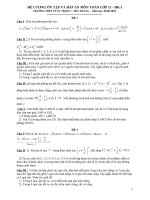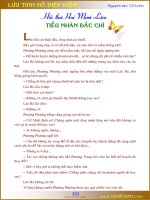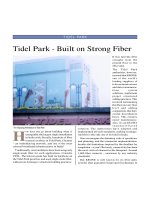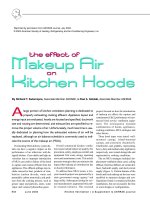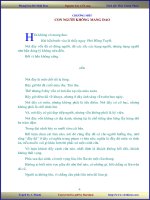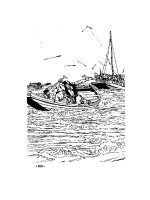Tài liệu WorldwidWorldwide Fuel Quality Trends Focus on Asia pdf
Bạn đang xem bản rút gọn của tài liệu. Xem và tải ngay bản đầy đủ của tài liệu tại đây (807.32 KB, 20 trang )
Better Air Quality Workshop - Hong Ko
ng, December 2002
1
Worldwide
Worldwide
Fuel Quality Trends
Fuel Quality Trends
- Focus on Asia
- Focus on Asia
Liisa Kiuru
Director, Asia
International Fuel Quality Center
Hart Downstream Energy Services
email:
www.
IFQC
.org
Better Air Quality Workshop - Hong Ko
ng, December 2002
2
International Fuel Quality Center
International Fuel Quality Center
What is the
International Fuel Quality Center
(IFQC)?
A specialized member service that provides comprehensive
information and concise analysis to members on pertinent actions
and issues facing the transportation industry worldwide.
The service focus and emphasis is on automotive fuel quality,
vehicle and engine related standards, and the health and
environmental legislative and regulatory pressures leading these
changes
Who is
IFQC?
Currently: over 75 Global Refining, Automotive and Technology
Companies and Governmental Organizations (more than 350
leading executives)
Working on the national, regional and international stage to
facilitate dialogue and information exchange between transport
related industries and governments
Better Air Quality Workshop - Hong Ko
ng, December 2002
3
International Fuel Quality Center
International Fuel Quality Center
Better Air Quality Workshop - Hong Ko
ng, December 2002
4
Presentation Overview
Presentation Overview
Drivers of Fuel Quality Developments
Automotive Fuel Quality Trends & Market
Developments (USA, EU and Asia)
Fuel Quality Monitoring
Alternative Fuels
APEC project
Better Air Quality Workshop - Hong Ko
ng, December 2002
5
World’s Automotive Fuel Market
World’s Automotive Fuel Market
F
u
e
l
s
p
e
c
i
f
i
c
a
t
i
o
n
s
L
e
a
d
S
u
l
f
u
r
D
i
s
t
i
l
l
a
t
i
o
n
A
r
o
m
a
t
i
c
s
O
c
t
a
n
e
/
C
e
t
a
n
e
A
d
d
i
t
i
v
e
s
O
x
y
g
e
n
a
t
e
s
E
n
g
i
n
e
t
e
c
h
n
o
l
o
g
i
e
s
•
D
i
r
e
c
t
I
n
j
e
c
t
i
o
n
•
H
y
b
r
i
d
s
•
F
u
e
l
c
e
l
l
s
A
l
t
e
r
n
a
t
i
v
e
f
u
e
l
s
•
B
i
o
-
f
u
e
l
s
•
L
P
G
•
C
N
G
•
G
a
s
t
o
L
i
q
u
i
d
•
H
2
E
n
v
i
r
o
n
m
e
n
t
•
G
l
o
b
a
l
•
C
o
u
n
t
r
y
•
R
e
g
i
o
n
a
l
•
L
o
c
a
l
P
o
l
i
t
i
c
s
R
e
f
i
n
i
n
g
I
n
d
u
s
t
r
y
&
t
e
c
h
n
o
l
o
g
y
E
c
o
n
o
m
y
E
n
e
r
g
y
S
e
c
u
r
i
t
y
L
o
c
a
l E
c
o
n
o
m
i
c
S
i
tu
a
t
io
n
•
go
v
e
r
n
m
e
n
t
a
l i
n
te
r
e
s
t
•
ta
x
e
s
•
F
u
el
a
d
u
l
te
r
a
tio
n
•
av
a
i
la
b
il
it
y
E
n
g
i
n
e
E
x
h
a
u
s
t
A
f
t
e
r
-
t
r
e
a
t
m
e
n
t
T
e
c
h
n
o
l
o
g
i
e
s
I
n
d
u
s
t
r
y
C
o
m
p
e
t
i
t
i
o
n
W
H
O
&
K
y
o
t
o
•
a
i
r
q
u
a
l
i
t
y
s
t
a
n
d
a
r
d
s
Better Air Quality Workshop - Hong Ko
ng, December 2002
6
World’s Automotive Fuel Market
World’s Automotive Fuel Market
WWFC
Dir 98/70:
2000
Euro III
Dir 98/70:
2005
Euro IV
CARB
Phase 2:
1996
CARB
Phase 3:
2003
Category 3
Aromatics, vol%.max 42 35 30 35 35
Olefins, vol%, max 18 18 10 10 10
Benzene, vol%, max 1.0 1.0 1.2 1.1 1.0
Oxygen, wt%, max 2.7 2.7 1.8 - 3.5 1.8 - 3.5
2.7
Sulfur, ppm, max 150 50 (10) 80 60 / 30
30
RVP, kPa 60 / 70 60 / 70 48 44 - 50
45-60 *
Lead, g/l, max none none 0.0013 0.0013
none
Dir 98/70:
2000
Dir 98/70:
2005
CARB
current
Category 3
Polyaromatics, vol%, max
11.0 11.0 -
2.0
Sulfur, ppm, max 350 50 (10) 500
30
Cetane number, min 51 51 48
55
Density @ 15 °C, kg/m
3
845 845 820 - 870
820-840
Distillation, T95, °C, max
360 360 -
340
* depends on ambient temperature and season
EU
USA
GASOLINE
DIESEL
Better Air Quality Workshop - Hong Ko
ng, December 2002
7
Worldwide Consumption;
Worldwide Consumption;
Transportation Sector
Transportation Sector
Consumption for Transportation in Asia, 1990-2020
0
2
4
6
8
10
12
14
16
18
1990 1998 1999 2005 2010 2015 2020
Millions of Barrels of Oil per Day
Source : Derived from Energy Information Administration (EIA)
GASOLINE
DIESEL
JET FUEL
RESIDUAL
FUEL
Better Air Quality Workshop - Hong Ko
ng, December 2002
8
Automotive Market
Automotive Market
Better Air Quality Workshop - Hong Ko
ng, December 2002
9
Gasoline & Diesel Demand (2000)
Gasoline & Diesel Demand (2000)
GASOLINE DIESEL
Source:
FACTS-EWCI Databook
Gasoline/Diesel Demand in Asian countries (2000)
0% 20% 40% 60% 80% 100%
Australia
China
India
Indonesia
Japan
Malaysia
Pakistan
Philippines
Singapore
South Korea
Taiwan
Thailand
Vietnam
Other
Better Air Quality Workshop - Hong Ko
ng, December 2002
10
Demand & Import/Export
Demand & Import/Export
Gasoline+Diesel (2000)
Gasoline+Diesel (2000)
Source:
FACTS-EWCI Databook
Diesel: Demand and Import / Export
0 400 800 1200 1600
Australia
Brunei
China
India
Indonesia
Japan
Malaysia
New Zealand
Pakistan
Philippines
Singapore
South Korea
Taiwan
Thailand
Vietnam
Other
0 400 800 1200 1600
Demand
Export
Import
1 000 b/d
Better Air Quality Workshop - Hong Ko
ng, December 2002
11
•
Policy options to support lead phase out: Mandatory phase out by
certain date, fuel taxes and other incentive policies, unleaded fuel dispenser
nozzle, mandating unleaded pumps, mandate vehicle design for unleaded
gasoline
Lead Phase Out
Lead Phase Out
1996 2005
Lead free, 0.15 gPb/l, more than 0.15 gPb/l
Better Air Quality Workshop - Hong Ko
ng, December 2002
12
Source: IFQC
Gasoline Sulfur Levels
Gasoline Sulfur Levels
– now and in the future
– now and in the future
2002
2003
2004
2005
2006
2007
2008
2009
2010
2011
EU
USA (California)
USA
Japan *
Australia
Brunei ^
China *
Hong Kong
India *
Indonesia *
Malaysia
New Zealand
Papua New Guinea ^*
Phillippines
Singapore *
South Korea *
Taiwan *
Thailand *
Vietnam
0
500
1,000
1,500
2,000
Sulphur (ppm)
Source: IFQC
NOTE:
* Future specifications are only proposed
^ Industry limits
Better Air Quality Workshop - Hong Ko
ng, December 2002
13
Source: IFQC
Diesel Sulfur Levels
Diesel Sulfur Levels
– now and in the future
– now and in the future
2002
2003
2004
2005
2006
2007
2008
2009
2010
EU
USA (California)
USA
Japan *
Australia
Brunei ^
China *
Hong Kong
India *
Indonesia *
Malaysia
New Zealand
Papua New Guinea ^*
Phillippines
Singapore *
South Korea *
Taiwan *
Thailand *
Vietnam
0
500
1,000
1,500
2,000
2,500
3,000
3,500
4,000
4,500
5,000
5,500
Sulphur (ppm)
Source: IFQC
NOTE:
* Future specifications are only proposed
^ Industry limits
Better Air Quality Workshop - Hong Ko
ng, December 2002
14
Fuel Quality Monitoring
Fuel Quality Monitoring
Differences between the different country and regional approaches
US
Comprehensive legislation on cleaner fuels (RFG, MSAT,
diesel/gasoline sulphur rule etc.)
Criminal liability and punitive element
EU
Only one fuel quality legislation
proposed EU standards (FQMS) not mandatory, no policing
structure
lack of FQM in southern countries
Asia
Fuel specifications not as developed in many countries
Fuel quality monitoring legislation lacking in many countries
Fuel adulteration big problem
Better Air Quality Workshop - Hong Ko
ng, December 2002
15
Alternative Fuels
Alternative Fuels
CNG / LPG
Ethanol – gasohol & e-diesel
Biodiesel
Fuel Cell
Gas-to-liquids
Better Air Quality Workshop - Hong Ko
ng, December 2002
16
Diesel
600
Gasoline*
950
1,550 Mtoe*
*Not including petrochemical sector, airplanes
LPG
EtOH
Natural Gas
Bio: Diester
ETBE
Alternative
Fuels 27 Mtoe (1.7%)
Source: IFP / Axens
*including MTBE
Road Transportation Fuels
Road Transportation Fuels
World 2000
World 2000
Better Air Quality Workshop - Hong Ko
ng, December 2002
17
APEC Clean Transportation Fuels
APEC Clean Transportation Fuels
Supply Security Study
Supply Security Study
Australia New Zealand
Brunei Papua N. Guinea
Canada Peru
Chile Philippines
PR C (China) Russia
Hong Kong Singapore
Indonesia Chinese Taipei
Japan Thailand
Korea United States
Malaysia Viet Nam
Mexico
Better Air Quality Workshop - Hong Ko
ng, December 2002
18
APEC Clean Transportation Fuels
APEC Clean Transportation Fuels
Supply Security Study
Supply Security Study
Project Objectives
Study current and planned specifications for
transportation fuels in APEC region
Study supply capabilities of refineries in region
Match supply and demand and forecast supply security
up to 2012
Review APEC member economies policies on alternative
fuels and forecast how each will impact clean fuel supply
Better Air Quality Workshop - Hong Ko
ng, December 2002
19
APEC Clean Transportation Fuels
APEC Clean Transportation Fuels
Supply Security Study
Supply Security Study
Preliminary Conclusions & Highlights
Asia Pacific refining currently in severe economic downturn
Chinese outlook is key to revitalizing industry in region
Tightening of fuel specs & demand growth will absorb any existing
overcapacity by 2006
By 2006, the region’s supply demand/balance will be extremely tight
for all products, particularly if some member economies delay refining
investments
Substantial investment (US$10 billion) will be required to keep pace
with demand for cleaner fuels beyond 2006
Harmonization with international fuel standards will continue, albeit
slowly
Korea, Japan &Taipei, China likely to continue to lead drive toward
cleaner fuels
Better Air Quality Workshop - Hong Ko
ng, December 2002
20
Thank you! Any Questions?
Thank you! Any Questions?
Liisa Kiuru
Director, Asia
International Fuel Quality Center
email:
www.
IFQC
.org
